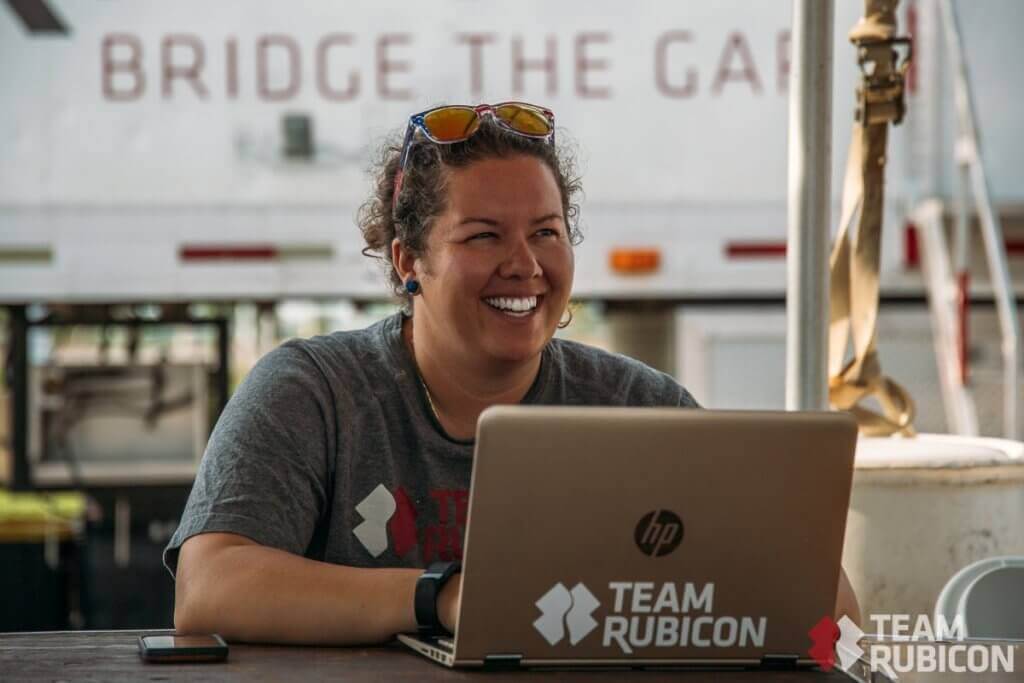
Region I Wellness Manager Jennifer Lawrence recently deployed to Illinois to provide flood relief alongside fellow Greyshirts of Team Rubicon.
What is a Team Rubicon Wellness Manager, and why is the role important to the organization?
Wellness Managers are volunteers who have a background/specialty in mental health and are licensed therapists. We help support TR members by facilitating assessment and triage of distressed Greyshirts during crisis, provide referrals and hand-offs to local mental health providers, and share resources and tools to promote positive mental health and wellness.
Our role is important to the organization because we help increase resiliency and readiness among our volunteer base, which in turn leads to increased safety in the field and decreased burnout. As mental health providers, we are able to provide crisis intervention when needed and offer support to people who might be experiencing difficulty. We are here to serve alongside Greyshirts while also providing a safe, confidential resource to access additional support.

What about your background makes you qualified for the position?
I am a licensed social worker, but my educational and professional background are only part of what makes me qualified for this position. In addition, I am an ASIST (Applied Suicide Intervention Skills Training) trainer and have worked with veterans, first responders, and disaster responders in a clinical capacity in both formal and informal settings. My passion for using my background to best support TR members and the homeowners we serve are what really makes me a good fit for TR. Being a people-person, having a solid sense of humor, and the innate desire to serve others are important qualifiers for this position, too!
Talk about the support you provided on Operation Fox Yeah.
This was the first time we had a dedicated Wellness leader on an operation, and it was an extremely positive experience as many volunteers benefited from the support and follow up. By collaborating with Command and General Staff, strike team leaders, and Greyshirts, I was able to support volunteers who were struggling, talk about the post-deployment blues during an afternoon debrief before a wave of volunteers left for home, provide crisis intervention when needed, and put a positive face to wellness/mental health.

No one who sees disaster is untouched by it, so some of my time was spent sitting with volunteers and processing through the difficulty of seeing homes destroyed by a flood and the emotional impact of hearing stories from devastated homeowners. Other times, I was educating and connecting volunteers with resources like local counselors, therapeutic recreational activities, and area wellness support for when they return home. Some volunteers have never spoken to a mental health therapist before or had a negative experience, so I was able to (hopefully!) break down some stigma surrounding mental health treatment and provide a positive example of what treatment might look like.
Overall, my goal was to connect with the volunteers to provide formal and informal support to increase their resiliency and ability to continue to do this difficult work throughout their deployment and then successfully transition back into their normal routine when they return home after the op.

What recommendations do you have for those who may be going through a transition or difficult time and looking for resources?
For those who are going through a transition or difficult time, reach out and use your network because there are people and resources to support you. You have the drive, enthusiasm, and compassion to help people who are potentially having the worst day of their life, and this extends to taking care of ourselves, too. We all got involved in TR for our own individual reasons but we share a collective desire to support others; your personal history brings a specific expertise to our team which makes you a unique and integral part of this family.
Also, people can reach out to me or another regional wellness manager or access these resources:
- To find a local, free counselor: giveanhour.org
- Veterans Crisis Line at 1.800.273.TALK (8255) and press, chat online: veteranscrisisline.net, or text: 838255
- National Suicide Prevention Hotline at 1.800.273.TALK (8255) or visit suicidepreventionlifeline.org
- National Hopeline Network at 1-800-SUICIDE (1-800-784-2433)



